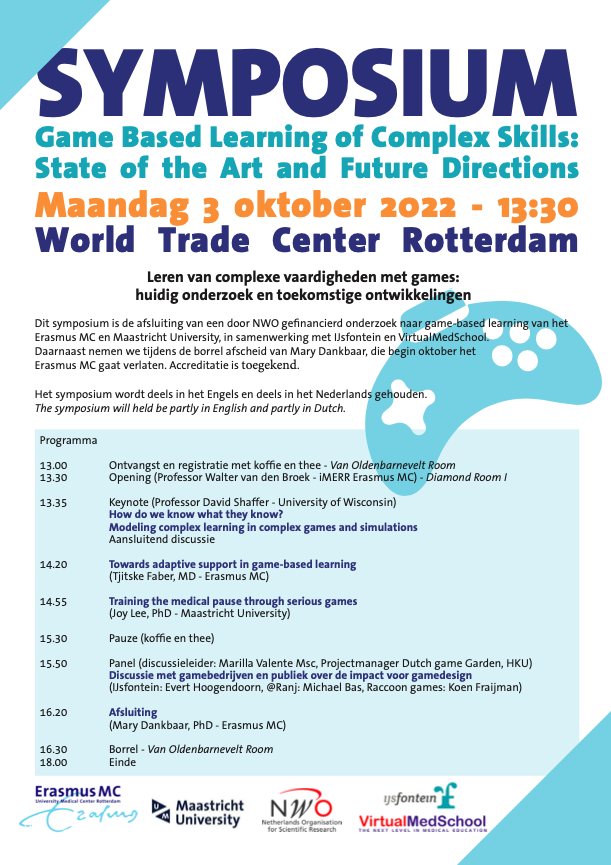Symposium Game-Based Learning of Complex Skills: State of the Art and Future Directions
VirtualMedSchool will be present at the symposium “Game-Based Learning of Complex Skills: State of the Art and Future Directions,” which takes place Monday, October 3rd, in the World Trade Center Rotterdam. This symposium concludes a NWO-funded research into game-based learning by Erasmus MC and Maastricht University, in collaboration with IJsfontein and VirtualMedSchool, for which our abdeSIM has been used. In addition, we say goodbye to Mary Dankbaar, who will leave Erasmus MC at the beginning of October.
Abstracts of this Symposium:
How do we know what they know? (professor David Shaffer – University of Wisconsin)
Games and simulations let learners face challenges that are too difficult, dangerous, or expensive for them to do in real situations. As a result, they can develop complex problem solving skills and understand complex domains. For example, clinical simulations can let medical students practice patient assessment and resuscitation, surgical skills, situational awareness, decision making, teamwork, and leadership — that is, to help medical students learn to think and act like doctors. But how do we measure what it means to “think like a doctor” (or a nurse, or a lawyer, or an engineer)? This talk looks at how games and simulations develop complex ways of thinking, and how we can model the kind of complex learning that creates better practitioners.
David Williamson Shaffer is the Sears Bascom Professor of Learning Analytics and the Vilas Distinguished Achievement Professor of Learning Sciences at the University of Wisconsin-Madison and a Data Philosopher at the Wisconsin Center for Education Research. His M.S. and Ph.D. are from the Media Laboratory at the Massachusetts Institute of Technology. Prof. Shaffer was a 2008-2009 European Union Marie Curie Fellow at the Utrecht University. His publications include the books ‘How Computer Games Help Children Learn’ and ‘Quantitative Ethnography’, and his current focus is on merging statistical and qualitative methods to model complex and collaborative thinking skills.
Towards adaptive support in game-based learning (Tjitske Faber, MD – Erasmus MC)
By adapting support to the player, engagement, motivation and learning in games may improve. How can we tell whether students need support and how does adaptive support influence the learning process? In this presentation, we will discuss potential indicators for support in a medical emergency game and the results of our research into adaptive support.
Training the medical pause through serious games (Joy Lee, PhD – Maastricht University)
The medical pause, stopping current performance for additional cognitive activities, advances patient safety and learning in medicine. Yet, to date, we do not have a sufficient understanding of how the medical pause works and how pausing skills should be taught as a professional skill. To improve the understanding, this project investigates the effects of pausing in medical training using serious games and VR simulation. For empirical research, we use eye-tracking and log data as indicators to assess performance.
For more information and full program, click here.

